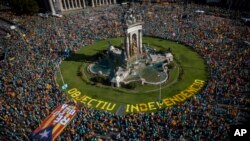Hundreds of thousands of Spaniards who support the secession of Catalonia gathered in Barcelona on the region’s main holiday Wednesday, just weeks before a highly anticipated verdict in a case against 12 leaders of the separatist movement.
Supporters of Catalan secession came from all parts of the wealthy northeastern region to its main city. Many carried flags or wore T-shirts supporting Catalan independence as they met for the rally in a large public square.
The Sept. 11 holiday memorializes the fall of Barcelona in the Spanish War of Succession in 1714. Since 2012, it has become the date of massive rallies for the region’s secessionist movement.
The Barcelona police said that around 600,000 people turned out for the event.
Polls and the most recent election results show that the region’s 7.5 million residents are roughly equally split between those in favor and those against breaking with the rest of Spain.
Spain’s caretaker prime minister, Pedro Sánchez, who has tried to thaw tensions with Catalonia since taking power last year, wrote on Twitter that “Today should be a day for all Catalans. For the path of dialogue within the Constitution, harmonious coexistence, respect and understanding.”
This year’s rally comes while a dozen leaders of Catalonia’s 2017 failed attempt to secede await a verdict from the Supreme Court on charges that include rebellion. They face spending several years behind bars if found guilty, and a heavy punishment would most likely spark public protests in Catalonia. The verdict is expected this month or next.
The movement, however, is going through its most difficult period since separatist sentiment was fueled by the previous decade’s economic difficulties, from which Spain has only recovered in recent years.
The pro-secession political parties have yet to agree on what the response to a guilty verdict by the Supreme Court should be. That has earned the criticism of the leading grassroots groups which have fueled the secessionist drive.
Regional Catalan president Quim Torra says that a guilty verdict would provide an opportunity to make another push for independence, without specifying how that could be carried out.
“The objective of independence should be the horizon of this country after the verdict,” he said in a recent interview on Catalan public television.
Other separatist politicians think the best move is to call regional elections in an attempt to increase their representation in the regional parliament and focus on gaining the backing of more than half of Catalans. Those against independence complain that the separatists have monopolized the holiday for their political ends.
But some activists have accused all their political leaders of not taking concrete steps to achieve their goal. Radical activists recently expressed their anger by throwing garbage and excrement on the doors of the offices of pro-secession parties.
“Not only have we not advanced, but we have taken some steps backward,” Elisenda Paluzie, the head of the influential pro-secession grassroots group ANC, told the crowd. “We demand that our leaders don’t let us down.”




